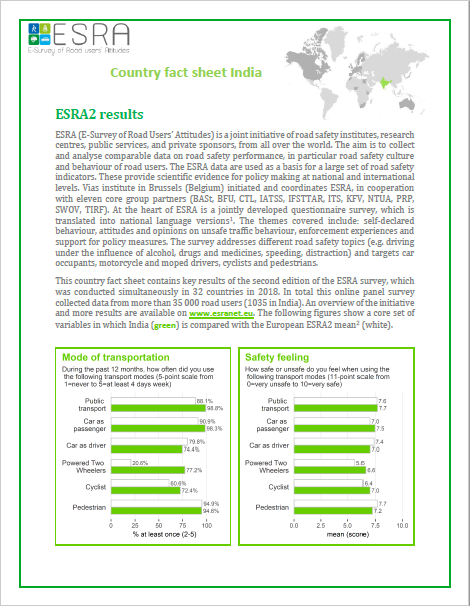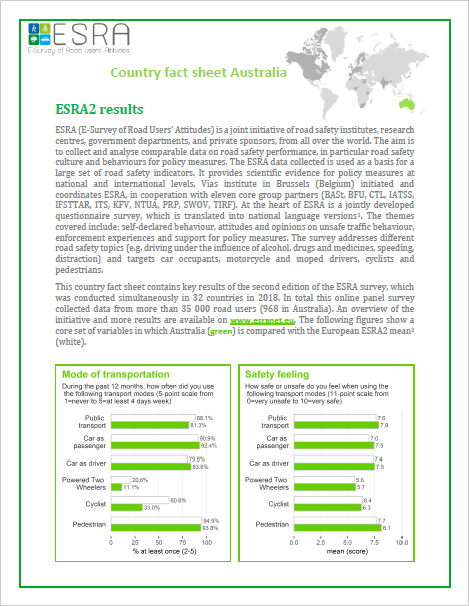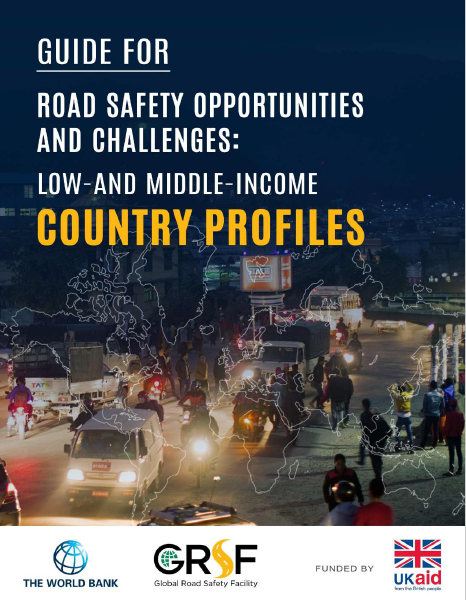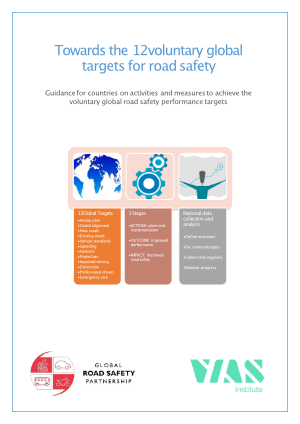E-Survey of Road Users’ Attitudes (ESRA) - India Country Fact Sheet

ESRA (E-Survey of Road Users’ Attitudes) is a joint initiative of road safety institutes, research centres, government departments, and private sponsors, from all over the world. The aim is to collect and analyse comparable data on road safety performance, in particular road safety culture and behaviours for policy measures.
The ESRA data collected is used as a basis for a large set of road safety indicators. It provides scientific evidence for policy measures at national and international levels. Vias institute in Brussels (Belgium) initiated and coordinates ESRA, in cooperation with eleven core group partners. At the heart of ESRA is a jointly developed questionnaire survey, which is translated into national language versions. The themes covered include: self-declared behaviour, attitudes and opinions on unsafe traffic behaviour, enforcement experiences and support for policy measures. The survey addresses different road safety topics (e.g. driving under the influence of alcohol, drugs and medicines, speeding, distraction) and targets car occupants, motorcycle and moped drivers, cyclists and pedestrians.
This country fact sheet contains key results of the second edition of the ESRA survey, which was conducted simultaneously in 32 countries in 2018. In total this online panel survey collected data from more than 35 000 road users (1035 in India).
E-Survey of Road Users’ Attitudes (ESRA) - Australia Country Fact Sheet

ESRA (E-Survey of Road Users’ Attitudes) is a joint initiative of road safety institutes, research centres, government departments, and private sponsors, from all over the world. The aim is to collect and analyse comparable data on road safety performance, in particular road safety culture and behaviours for policy measures.
The ESRA data collected is used as a basis for a large set of road safety indicators. It provides scientific evidence for policy measures at national and international levels. Vias institute in Brussels (Belgium) initiated and coordinates ESRA, in cooperation with eleven core group partners. At the heart of ESRA is a jointly developed questionnaire survey, which is translated into national language versions. The themes covered include: self-declared behaviour, attitudes and opinions on unsafe traffic behaviour, enforcement experiences and support for policy measures. The survey addresses different road safety topics (e.g. driving under the influence of alcohol, drugs and medicines, speeding, distraction) and targets car occupants, motorcycle and moped drivers, cyclists and pedestrians.
This country fact sheet contains key results of the second edition of the ESRA survey, which was conducted simultaneously in 32 countries in 2018. In total this online panel survey collected data from more than 35 000 road users (968 in Australia).
Guide for Road Safety Opportunities and Challenges: Low and Middle-Income Country Profiles

The Guide for Road Safety Opportunities and Challenges: Low and Middle-Income Country Profiles, is the first data report to cover all 125 LMICs with comprehensive road safety country profiles. The profiles present information on each pillar of road safety—management, roads, speed, vehicles, road users, and post-crash care—, to help countries and development practitioners identify challenges and opportunities, and monitor progress. The guide gives a precise assessment on the magnitude and complexity of road safety challenges faced by LMICs and helps policy makers understand the road safety framework in context of their own country systems and performance.
This report responds to the critical need for collecting and documenting accurate road safety performance data. It assembles information from multiple important and high-quality sources to take stock of any given country’s past achievements on road safety, establishing a baseline for the next decade of action across many areas of policy and performance.
Practical Road Safety Engineering Workshop, July to August 2020
Contact Person
Towards the 12 voluntary global targets for road safety: Guidance for countries on activities and measures to achieve the voluntary global road safety performance targets

This document acts as a guide to assist countries to monitor and report on the 12 Voluntary Global Road Safety Performance Targets, on which a consensus had been reached during a meeting of WHO Member States held in November 2017 in Geneva, Switzerland.
The voluntary global performance targets for road safety risk factors and service delivery mechanisms are a means to enable countries to monitor and report on progress on road safety efforts. This timely document provides guidance to countries on how to operationalize and utilize these targets. It spells out what type of activities need to be undertaken, what data sources can be used and how performance can be measured and presented. It defines each target and points out what actions need to be taken and how each target can be measured.
Video Message by Young Tae Kim - First Workshop on the Implementation of the Asia Pacific Road Safety Observatory
Video Message by Hartwig Schafer - First Workshop on the Implementation of the Asia Pacific Road Safety Observatory
Crowdsourced Data Platform and Insights to Improve Road Safety in Asia and the Pacific
Contact Person
Collaboration with WHO towards improving road safety data quality
Contact Person
Progress on development of Regional Road Safety Observatories
Pagination
- Previous page
- Page 2
- Next page